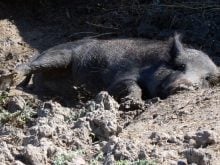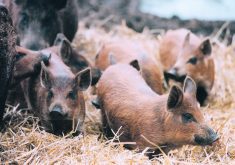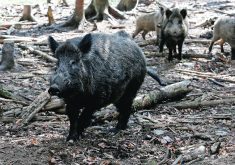Neighbouring municipality had asked Clearwater County to prohibit wild boar, but county insists measure not needed
An Alberta county has rejected a request to approve a proposed animal control bylaw prohibiting wild boar within its borders, instead preferring to continue to manage the animals under the provincial Agricultural Pests Act.
“Clearwater County has one of the largest populations of feral horses in Canada,” said Matt Martinson, director of agriculture and community services for the rural municipality west of Red Deer.
“Nobody wants to talk about that, but we love talking about feral hogs, so yeah, I can never understand that (as) a farm boy from central Alberta… for us, it’s just another species of pest to manage on the land.”
Read Also

Using artificial intelligence in agriculture starts with the right data
Good data is critical as the agriculture sector increasingly adopts new AI technology to drive efficiency, sustainability and trust across all levels of the value chain.
The bylaw was requested by neighbouring Mountain View County, which has a similar bylaw, said Martinson. Clearwater County contains one producer who raises wild boar, he said.
Alberta Pork wants all counties in the province to gradually start prohibiting wild boar, said industry programs manager Charlotte Shipp. The spread of feral pigs is sparking concerns ranging from damage to crops to the potential spread of diseases such as African swine fever to domestic pigs, she said.
Wild hogs are a massive threat to agriculture in the province, said Paul McLauchlin, president of the Rural Municipalities of Alberta. The provincial government needs to give the same effort to preventing the spread of wild pigs as it does for rats, he said.
After establishing the Rat Control Program in 1950, Alberta became the only province in Canada to be free of the rodents.
“I’ve seen fields in the south of the United States that feral hogs have just completely destroyed,” said McLauchlin.
“I’ve seen what they’ve done in Saskatchewan. We need to do whatever it takes to not allow another population to grow in Alberta, and when you do the math on the size of their litters and how quickly they can reproduce, this is a really big problem that we need to put a lot of energy into.”
The provincial government developed a Wild Boar Program last year that included compensation for farmers, along with bounties for landowners and trappers. A one-year pilot program that offered bounties for hunters in participating municipalities ended March 31.
The problem with eradication through hunting is that wild hogs are strong, fast and intelligent animals capable of changing their behaviour, said McLauchlin. As someone who has hunted wild boar in Florida, he said they are unlike any other animal he has encountered.
Hunting makes wild pigs go nocturnal, and once that happens, “they’ve won the game,” he said. “And in Texas, billions of dollars of crops are destroyed because they pushed them to be fully nocturnal by trying to hunt them.”
McLauchlin said the provincial government needs to work with organizations such as agricultural associations to come up with effective strategies for Alberta.
“And I would definitely, from what I’ve read in the literature, I would not say bounties are a good idea for dealing with hog populations.”
Clearwater County Reeve Daryl Lougheed told a council meeting March 28 he agreed with the county’s Agricultural Services Board that a bylaw banning wild boar was unnecessary.
“Definitely for me, I do believe we have the right tools in place and have had a track record of being able to manage this without going to the extent of creating a prohibitive bylaw.”
Regulations under the Agricultural Pests Act require producers to follow measures such as maintaining sufficient fences to contain wild boar, said Martinson during an interview. Clearwater County also has “a tremendous amount of resources when it comes to our rapid early detection and rapid response for the Pests Act,” he said.
It includes a trailer that can be deployed within hours of being notified a wild boar is at large, along with the ability to quickly contract hunters and trappers, he said.
Martinson said municipal bylaws can be great tools for counties. However, each municipality in Alberta is responsible for distinct geographic areas that face unique challenges.
“Clearwater County is a very rural, livestock-focused county in west-central Alberta, and so producing and harvesting your own food on your property, specifically meat, is a long-held tradition and principle of our agricultural and rural population. Any step toward limiting agricultural producers’ and landowners’ ability to harvest meat on their property could be viewed as overreach to the fundamental rights of rural citizens in this county.”
However, councillor Jordon Northcott told the council meeting he had received comments from residents who are “concerned about the negative impacts and the disaster that these wild boars could have. So, I would be in favour of following Mountain View or Red Deer County’s bylaws, but allowing that one producer to operate as non-conforming….”
Alberta Pork sent a tweet March 30 calling the decision by Clearwater County unfortunate because wild boar pose a serious risk to farmers and trade.
“But it’s a very complex and multifaceted issue for counties to deal with, so we certainly do recognize that as well,” said Shipp.
The problem is being studied under a four-year research project launched in 2022 led by the University of Calgary.
African swine fever causes a high rate of death in pigs, said Mathieu Pruvot, assistant professor at the University of Calgary’s Faculty of Veterinary Medicine. The rapid global expansion of the disease combined with the spread of wild pigs in Alberta raises fears about the virus eventually infecting the province’s domestic pigs, he said.
An outbreak would quickly shut down the entire pork industry, which is “one of the reasons we’re trying to be as proactive as we can,” said Pruvot.
Researchers are also examining the potential transmission of diseases to other types of livestock, along with issues such as harassment of farm animals, crop damage and road collisions by feral pigs, he said.
“There’s nothing really good coming out of letting these wild pigs reproduce and spread, so that’s why we’re really hoping we can get a better grasp of their distribution, their population structure, as a way to inform where and when and how we can best control them.”
For the full March 28 Clearview County council meeting on YouTube, visit bit.ly/3KsNUwY.
















